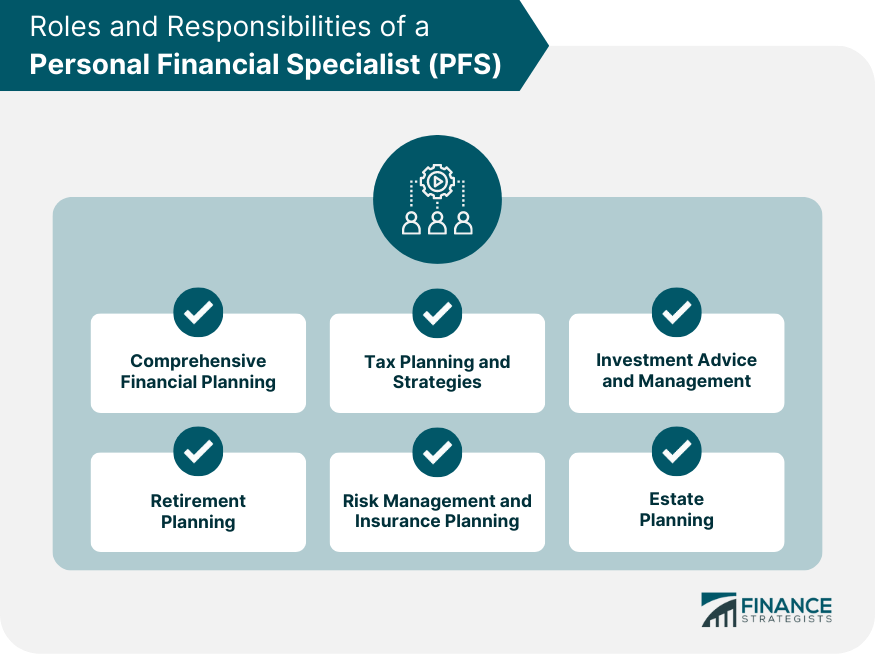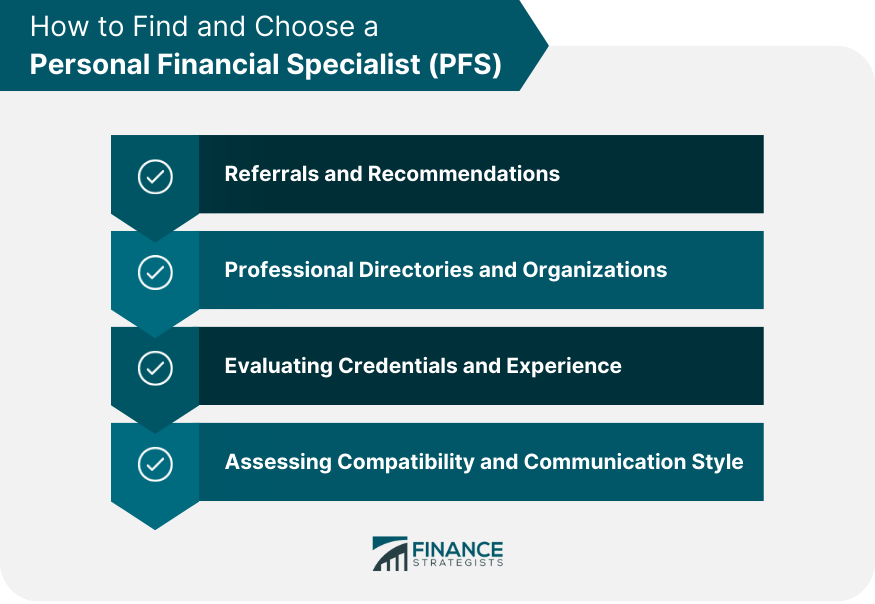A PFS is a financial professional who holds a specialized designation granted by the American Institute of Certified Public Accountants (AICPA). PFS professionals are Certified Public Accountants (CPAs) with extensive knowledge and expertise in personal financial planning, enabling them to provide comprehensive financial advice and services to individuals and families. The PFS designation demonstrates a high level of expertise and commitment to personal financial planning. These professionals are uniquely qualified to assist clients in navigating complex financial matters, such as tax planning, investment management, and retirement planning. By working with a PFS, clients can benefit from tailored financial strategies and expert guidance to achieve their financial goals. Personal Financial Specialists provide comprehensive financial planning services, considering all aspects of a client's financial situation, goals, and objectives. They help clients create a cohesive financial plan that addresses short-term and long-term financial needs. As CPAs, PFS professionals possess in-depth knowledge of tax laws and regulations. They help clients develop tax-efficient financial strategies, minimize tax liabilities, and ensure compliance with tax filing requirements. PFS professionals provide investment advice and management services, assisting clients in selecting appropriate investments, constructing portfolios, and monitoring performance. They consider factors such as risk tolerance, investment objectives, and time horizon when making investment recommendations. Personal Financial Specialists help clients plan for retirement by evaluating their financial needs, identifying income sources, and developing strategies to maximize retirement savings and income. They also assist with Social Security planning and pension optimization. PFS professionals assess clients' risk exposure and help them develop risk management strategies to protect their financial well-being. This may include recommending appropriate insurance products, such as life, disability, and long-term care insurance. Estate planning is an essential aspect of personal financial planning. PFS professionals work with clients to develop estate plans that minimize estate taxes, protect assets, and ensure that their wishes are carried out in the event of their death. To become a Personal Financial Specialist, an individual must first hold a valid CPA license. The CPA designation ensures that the professional has met rigorous education and examination requirements in accounting and taxation. In addition to holding a CPA license, PFS candidates must have significant education and experience in personal financial planning. This includes completing a minimum of 75 hours of personal financial planning education and having at least two years of full-time experience in personal financial planning services. Candidates for the PFS designation must pass a comprehensive examination that covers various aspects of personal financial planning, including tax planning, investment management, retirement planning, risk management, and estate planning. To maintain the PFS designation, professionals must complete ongoing continuing education in personal financial planning and adhere to the AICPA's professional standards and ethical requirements. Fee-only PFS professionals charge a flat fee or a percentage of assets under management for their services. This compensation model eliminates potential conflicts of interest that may arise from commissions or product sales, ensuring that the PFS's advice is unbiased and in the client's best interest. Fee-based PFS professionals may charge a combination of fees and commissions for their services. This compensation model may create potential conflicts of interest, as the professional may receive compensation from product sales or referrals. Commission-based PFS professionals receive compensation through commissions on the sale of financial products or referrals to other financial professionals. This compensation model can create potential conflicts of interest, as the PFS's recommendations may be influenced by the commissions they receive. PFS professionals possess a unique combination of tax and financial planning expertise, allowing them to provide clients with comprehensive and integrated financial advice. Personal Financial Specialists take a holistic approach to personal finance, considering all aspects of a client's financial situation and goals when developing financial strategies and recommendations. As fiduciaries, PFS professionals are obligated to act in their clients' best interests, providing objective and unbiased advice tailored to each client's specific needs and objectives. Personal Financial Specialists create customized financial strategies for their clients, taking into account individual goals, risk tolerance, and unique financial circumstances. This personalized approach ensures that clients receive advice and guidance that is most suitable for their specific situation. One of the most effective ways to find a Personal Financial Specialist is through referrals from friends, family, or colleagues who have had positive experiences with a PFS professional. These personal recommendations can provide valuable insights into the quality of service and expertise provided by a PFS. The AICPA maintains a directory of PFS professionals, which can be a useful resource for finding a qualified PFS in your area. Additionally, local professional organizations and financial planning associations may have listings of PFS professionals. When considering a Personal Financial Specialist, it is essential to evaluate their credentials and experience. Verify that they hold a valid CPA license and PFS designation, and inquire about their experience in providing personal financial planning services. The relationship between a client and their PFS professional is built on trust and open communication. When selecting a PFS, consider their communication style, availability, and willingness to listen to your needs and concerns. A strong working relationship with your PFS is crucial for achieving your financial goals. Personal Financial Specialists play a vital role in helping clients achieve their financial goals by providing expert, comprehensive financial planning services. By leveraging their unique expertise in tax and financial planning, PFS professionals can help clients navigate the complexities of their financial lives and create tailored strategies to grow and protect their wealth. Choosing the right Personal Financial Specialist is essential for ensuring that you receive the best possible financial advice and guidance to achieve your financial objectives. By carefully evaluating a PFS's credentials, experience, communication style, and compensation structure, you can select a professional who is well-suited to your needs and who will provide the expert assistance necessary to secure your financial future.What Is a Personal Financial Specialist (PFS)?
Roles and Responsibilities of a Personal Financial Specialist
Comprehensive Financial Planning
Tax Planning and Strategies
Investment Advice and Management
Retirement Planning
Risk Management and Insurance Planning
Estate Planning

Qualifications and Requirements for PFS Designation
Certified Public Accountant (CPA) License
Education and Experience in Personal Financial Planning
Passing the PFS Examination
Ongoing Continuing Education Requirements
Fee Structures and Compensation Models for Personal Financial Specialists
Fee-Only Compensation
Fee-Based Compensation
Commission-Based Compensation
Benefits of Hiring a Personal Financial Specialist
Expertise in Tax and Financial Planning
Holistic Approach to Personal Finance
Objective and Unbiased Advice
Tailored Financial Strategies
How to Find and Choose a Personal Financial Specialist
Referrals and Recommendations
Professional Directories and Organizations
Evaluating Credentials and Experience
Assessing Compatibility and Communication Style

Conclusion
Personal Financial Specialist (PFS) FAQs
A Personal Financial Specialist is a certified public accountant (CPA) who has additional expertise in personal financial planning. The PFS credential is issued by the American Institute of Certified Public Accountants (AICPA) to CPAs who have completed a rigorous education, examination, and experience requirements in personal financial planning.
A PFS provides a range of personal financial planning services, including retirement planning, estate planning, tax planning, investment planning, and risk management. They work closely with clients to develop a comprehensive financial plan that aligns with their goals and objectives.
A PFS is a CPA with additional expertise in personal financial planning, while a financial planner may come from a variety of backgrounds and may or may not have a professional certification. A PFS may focus specifically on tax-related issues in addition to broader financial planning concerns.
To become a PFS, you must be a licensed CPA and complete additional education and experience requirements in personal financial planning. The AICPA requires candidates to have at least three years of experience in personal financial planning and to pass a comprehensive exam.
When choosing a PFS, look for someone with experience and expertise in the areas of personal financial planning that are most important to you. Consider their education, credentials, and professional background, as well as their approach to financial planning and their fees. It's also important to choose someone who you feel comfortable working with and who understands your unique financial situation and goals.
True Tamplin is a published author, public speaker, CEO of UpDigital, and founder of Finance Strategists.
True is a Certified Educator in Personal Finance (CEPF®), author of The Handy Financial Ratios Guide, a member of the Society for Advancing Business Editing and Writing, contributes to his financial education site, Finance Strategists, and has spoken to various financial communities such as the CFA Institute, as well as university students like his Alma mater, Biola University, where he received a bachelor of science in business and data analytics.
To learn more about True, visit his personal website or view his author profiles on Amazon, Nasdaq and Forbes.











